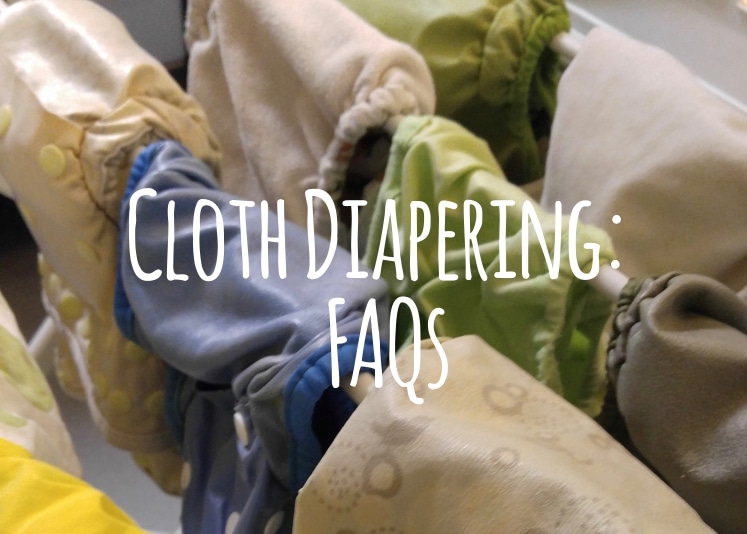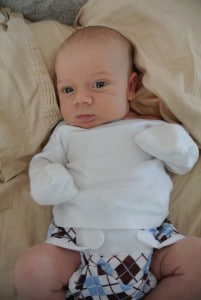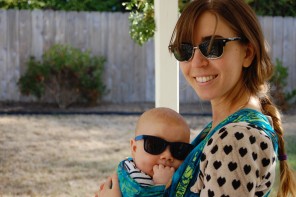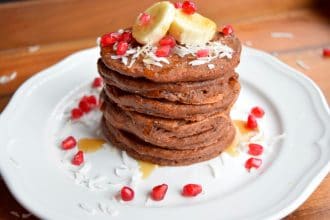I’ve tried to cover as much about cloth diapering as I know so far but I thought that I would create a separate post about cloth diapering a newborn as well as other FAQs about the subject. Before Dominik was born, I did a ton of research not only on what types of diapers to use and how to care for them, but how to even start.
Cloth Diapering a Newborn
Babies are born in a shapes and sizes, even when born full term. It seems like the average is anywhere between 6 and 10 pounds…and that’s a fairly large difference. And honestly, there’s no way to know how big your baby will be before they are born, even if the doctor “estimates” a weight. As someone who is fairly petite, I would have never guessed my baby would be over 8 pounds. So as you await the birth of your bundle of joy, I know it’s tempting to stock up on a ton of adorable diapers, but here are three tips:
1. Your one-size diapers probably will not fit right for at least the first several weeks, so chances are that you will need something smaller for that time
2. Wait until your baby is born to stock up on diapers for this beginning phase, you may not need newborn sized diapers at all
3. Try out a few different brands before investing in too many. Different brands fit some better than others, and you don’t want to be stuck with 20 diapers that leak every time you use them.
Dominik was only in the newborn size prefolds for 3 weeks, but they fit so nicely during that time. Now I use the newborn sizes as backup and to stuff the few pockets that I have. I am glad that I invested in the next size up right away because it was almost as if Dominik woke up one morning too small for the newborns.
Dealing with Poop
This is a major question that I was given when people found out I was cloth diapering. People typically believed that I would be handling poop more so than I would with disposables. But honestly, the opposite has been true. Because I never get blowouts, I really never have to deal with poop up the back and all over clothes. But there are a few things regarding poop that I need to keep in mind.
Babies who are exclusively breastfed have poop that is water soluble, which means everything will rinse away with water in the wash. However, formula fed babies and those that are given any solid food have poop that needs to be dumped in the toilet before washing. This is actually true of disposable diapers as well (it’s a sanitary issue in landfills), but no one really follows that rule. There are a few ways to go about this. You could just scrape and dump the poop, use a diaper sprayer to wash over the toilet, or use a flushable diaper liner and flush that. It really is personal preference. Dominik is still only breastfed, so I do not have experience or a preference as of yet. I do plan on trying out the flushable liners as well as the diaper sprayer to see what I like.
Traveling with Cloth Diapers
Traveling with cloth diapers is really not as bad as it sounds, but it can pose some problems. With disposables, you can just throw those away so there’s no worries about carrying them around. Also, when you need more, you can just run to the store. If you would like to travel while only using cloth, be sure to bring more diapers than you think you need, plenty of cloth wipes, and a wet bag that will be large enough to carry the soiled diapers (one that zips). Also, depending on how long you will be away from home, consider how you will store and/or wash the diapers.
This can often be stressful so there are two alternatives: investing in a hybrid that uses disposable inserts or just use disposables for the time you will be away from home. Investing in a hybrid is the more ecologically friendly choice, but honestly, there’s nothing wrong with baby using disposables for a little while. Traveling with kids is stressful enough, so don’t feel bad. When we travel, we use disposables because hybrids don’t fit into our budget. We do try to use the most natural and organic disposable diapers we can find to keep nasty chemicals away from Dominik’s skin.
Beating the Stink of Microfiber
Microfiber is great in that it is cheap and super absorbent. But one of the most common complaints with this material is that it often becomes stinky after some use. This is usually because the microfiber is not being properly washed, usually due to the lack of water in high efficiency machines, hard water, or the wrong type of detergent. Here are some tips to getting diapers fresh again:
-For HE washing machines, try adding a wet towel to the diaper load to trick the machine into adding more water. This will help to ensure all detergent and waste is washed completely out.
-Try adding an extra rinse and spin
-Let your diapers dry outside in the sun. The sun is a great natural form of bleach so your diapers will air out, freshen up, and look white again
-Try switching detergents
-If you have hard water, you could try to add a softener like Calgon. Hard water prevents detergent from completely rinsing
When Diapers Repel
Microfiber can also sometimes repel moisture instead of absorbing it. This can be from a buildup of detergent or if a substance that’s not cloth diaper friendly finds it’s way onto the dipes (like petroleum jelly). For this, you need to “strip” the diapers. Some people add things like Dawn dish soap or bleach to their wash cycles for this, but you really don’t need to. To strip your diapers, all you really need to do is wash them on hot for several cycles. This is kind of a way to “reset” the diapers.
Prepping Prefolds
Yay your fluff mail is finally here! You rip open the package to find perfectly flat and square prefolds that are waaay larger than you thought. In order to use them, they need to look smaller and have pillowy bumps all over them so it’s time to prep them. Prepping natural fibers gets the natural oils washed away so that they are left being super absorbent and soft. To prep:
-Wash diapers on COLD with no detergent to rinse away factory gunk
-Wash diapers on HOT with detergent
-Dry diapers on HOT in dryer
-Repeat 4 more times
*Do not wash natural fibers with microfiber until AFTER they have been prepped. The natural oils will cause your microfiber to repel. If it accidentally happens, no worries, but you may have to strip the microfiber.
Happy Diapering!






